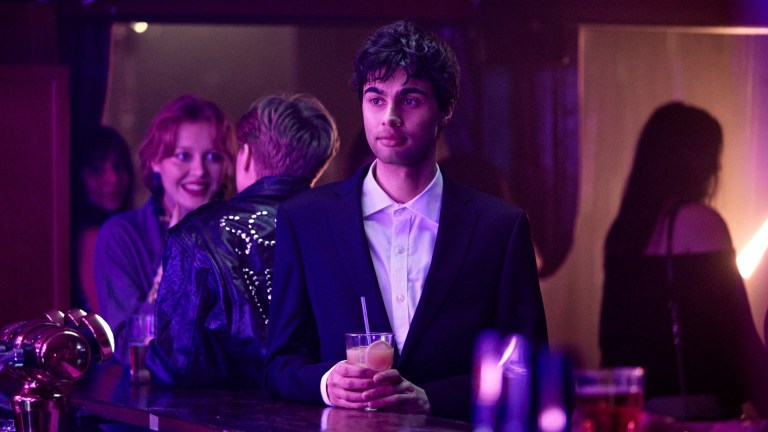Netflix’s Tore Is the Ideal Companion to Heartstopper
Netflix's grim and cynical LGBTQ+ Swedish import, Tore, pairs nicely with the sunshine and rainbows of Heartstopper.

This article contains spoilers for Tore season 1.
When it comes to LGBTQ+ representation, just seeing queer people on a TV screen is no longer sufficient for young people who are looking for answers. The way different shows depict the non-straight experience feels more vital than it did even 10 years ago due to an influx of streaming options and the variety of places and people the shows originate from. In the past, it often felt like LGBTQ+ characters received demeaning story arcs, such as being resigned to the villain role or being abruptly killed off in genres such as horror or crime dramas. This created a yearning for a delineated utopia of gay life, and Netflix’s Heartstopper thoroughly fulfilled that prototype.
The adaptation of Alice Osman’s graphic novels is a sugar rush, a righting of all the wrongs queer people have undergone both through media and in the real world. And while the show broke viewership records in its first two seasons for LGBTQ+ programming, the romanticizing of homoerotic teenage fervor might never come to fruition off the screen. Gay folks sometimes feel dejected watching a fantastical imagining of queer life, instead hungering for a show that gets gruff and edgy with the debilitating materialities of being part of the community.
Netflix’s newest Swedish import, Tore, defects from the candy-coated planet of soft “hi’s” and pastel animations in Heartstopper, engaging in a grim, tragic, and sometimes darkly comedic look at a gay man who doesn’t get a happily ever after. Created by and starring a relatively unknown William Spetz, Tore is a one-man ensemble, a character study with an unflinching desire to peel back every layer on a 27-year-old gay man who has experienced very little excitement in his quarter-century of life.
Tore is a lonely funeral home worker who lives with his father, Bosse (Peter Haber), and hangs out with his dog and best friend, Linn (Sanna Sundqvist). His father encourages him to step out of his comfort zone and leave the nest, something Tore doesn’t take kindly to. He wants to meander through daily life with the security blanket of his childhood abode and his patriarchal figurehead, but detours in life often come fast and furiously. Bosse gets hit by a truck on the same morning as this conversation takes place, and Tore’s reaction to his loving dad’s demise is, for lack of a better word, abhorrent. He doesn’t cry, get watery-eyed, or even react in the slightest to what happens. Instead, Tore goes on with his day and blocks out the trauma.
The reaction of Tore to this triggering event sets up the series’ crux perfectly. He isolates himself from Linn and his pup, even selling the labrador to a complete stranger by the middle of the six episodes. He puts on a thick mask that is held up by negative influences and stimulants such as drug-binged parties and sex-crazed randos on dating apps. He resents the life he was living before, but his attempts to apostatize from the mundane and the unfulfilling in the aftermath of his father’s death manifest in dark, morbid manners.
The aesthetic of Tore can hang like an ominous cloud over the audience. The marketing materials for the series say the look the directors were going for should remind people of Euphoria or Sex Education, but there really isn’t enough color in the world to feel like a symmetrical analogy. The palette is broody and moody, with a plethora of grays, blues, and purples used. Even when the lights of a rave come on, an absence of bright shades like yellow or orange blares in the viewer’s eyeballs. Tore most certainly serves as an antithesis to everything some queer people disliked about Heartstopper.
Tore is a half-glass empty reality check for LGBTQ+ youth looking for a sign of life getting better. It’s not going to be a peaceful escape for viewers with mental health struggles but rather an in-depth reenactment of how arduous the 20s can be for so many. It might bear so eerily reminiscent of audiences’ own lives that it could be triggering. Whether this is positive or negative really depends on the person watching, but the craftsmanship put into the storytelling is as sturdy as any other queer show to come out this year.
No LGBTQ+ series would be complete without a romance. One of the only uplifting relationships Tore falls into is with a soft-spoken, amicable florist near his house. Erik (Hannes Fohlin) seems to be the beacon of not only the virginity loss that Tore lusts for but also a true male kinship outside of his family home. Like most things for the downtrodden titular protagonist, it ends in heartbreak when Erik’s ex-boyfriend interrupts a moment of intimacy, ruining the vibe and the potential for future growth between Tore and Erik. The will-they won’t-they setup probably conjures a more relatable audience reaction than the serene Nick and Charlie ship from Heartstopper, but once again, whether someone enjoys realism or fantasy in their TV romances is to each their own.
One must truly watch through the end to comprehend the entirety of the pain and the reawakening Tore succeeds through. The final episode saves the program from becoming obsessed with its own grim reaper, allowing Tore to heal from his loss and look hesitantly into the future with Linn and a local drag queen, Shady Meat (Carlos Romero Cruz), by his side. Found family certainly presides as a theme in a large majority of queer programming, and the thesis of Tore religiously abides by this LGBTQ+ doctrine. The final shot of the series poignantly captures the growth the main character underwent in such a brief time period, and it balances the fatalism of the script.
Tore isn’t better or worse than Heartstopper; it’s just different. Exquisitely contrary in its goals and acted with dedication by Spetz, the show meanders through plotlines similarly to how its protagonist jumbles through the crowds of a boozed-up party. It lets the viewer breathe with the character, cry with him, and learn to deal with life’s worst curveballs with him. LGBTQ+ TV fans will feel the entire gamut of emotions with Tore, and that definitely seems like a plaudit not every show elicits these days.
All six episodes of Tore are available to stream on Netflix now.
